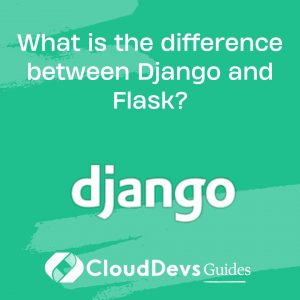What is the difference between Django and Flask?
Django and Flask are both popular Python web frameworks, but they differ in several key aspects, making each suitable for different use cases:
- Complexity and Opinionation:
– Django: Django is a high-level, full-stack framework known for its “batteries-included” philosophy. It provides a wide range of built-in features like an ORM, authentication, admin panel, and more. This can speed up development but may feel overwhelming for simple projects.
– Flask: Flask is a micro-framework that offers the essential tools for building web applications but leaves many decisions to the developer. It’s lightweight, flexible, and well-suited for projects where you want more control over components and libraries used.
- Flexibility and Control:
– Django: Django enforces a certain project structure and design patterns, which can limit flexibility but also promote best practices and consistency. It’s great for large, complex applications.
– Flask: Flask is minimalistic and allows developers to choose libraries, databases, and components as per their preferences. This flexibility is excellent for small to medium-sized projects or when you have specific requirements.
- Learning Curve:
– Django: Due to its comprehensive nature, Django has a steeper learning curve, especially for beginners. However, it provides extensive documentation and a well-defined project structure that can help newcomers.
– Flask: Flask’s simplicity makes it easier for developers to get started quickly. It’s often recommended for beginners and those who want to learn web development from the ground up.
- Community and Ecosystem:
– Django: Django has a large and active community, with many third-party packages and extensions available, which can save development time. It’s well-suited for projects that need to leverage a mature ecosystem.
– Flask: Flask also has a strong community and a variety of extensions, but it may not have the same breadth as Django. However, it allows you to pick and choose components more freely.
- Use Cases:
– Django: Ideal for large-scale, feature-rich web applications, content management systems, and applications that require rapid development with built-in functionality.
– Flask: Best suited for smaller projects, RESTful APIs, microservices, and situations where you need precise control over every aspect of your application.
The choice between Django and Flask depends on the specific project requirements, your familiarity with the frameworks, and your development preferences. Django offers a comprehensive and opinionated framework for rapid development, while Flask provides flexibility and control for developers who want to build applications from the ground up.






